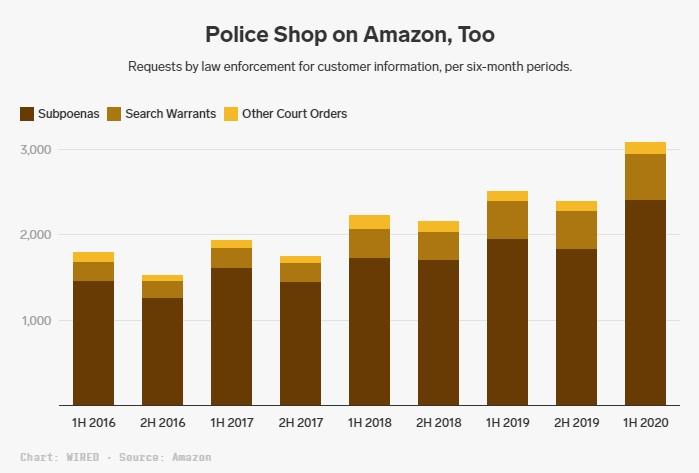 By Tyler Durden
By Tyler Durden
Amazon said it had received more than 3,000 requests for smart speaker user data from police earlier this year, according to a new article from Wired. Even more stunning, Amazon complied with the police’s requests on more than 2,000 occasions, forking over recordings and data that give law enforcement an ear into someone’s household.
This number marks a 72% increase in these types of requests from the same period in 2016 – the first time Amazon disclosed the data. The number of requests are up 24% year over year.
Douglas Orr, head of the criminal justice department at the University of North Georgia, told Wired that police look for this smart home data “as routinely as data from smartphones”. Police can continue to collect data if one electronic device (like a phone) leads them to another (like a smart home speaker) simply by amending search warrants, he said.
Google’s Nest unit has also seen a similar spike in police demands for data from its smart speakers. The company’s annual transparency report shows consistently rising numbers for police requests for data.
Meanwhile, Amazon said that “any number of entities” can request the data, but that they prioritize it based on urgency. Lee Whitfield, a forensic analyst, said: “Things like Homeland Security, they’re going to take high priority. Other law enforcement requests will come in under that. And then things like divorce cases or civil cases, they have a lower ranking.”
Officials value the data on smart speakers because it “can offer a timeline of a person’s activities, their location, if they’re alone, and can verify statements made during questioning.”
Orr said: “Usually the alibi you get is, ‘I was at home.’ Nobody can confirm that. So you ask, ‘Do you have a speaker?’”
Protect Your Privacy with a Phone Shield Faraday Bag
He has looked at the types of data that police can get from smart speakers – like the Amazon Echo you may have at your house right now. Voice clips are “only the beginning,” he said. Police can also ascertain time-stamped logs of user activity.
Police are also relying on wearables and smart devices to verify claims people make during an investigation, Orr says. Wired offers this example:
Heather Mahalik, a forensics instructor, recalls a Florida case in which a man killed his wife, then tried to impersonate her. The husband sent texts and Facebook messages from his wife’s phone in an attempt to blur the timeline of her disappearance.
While the woman’s phone activity continued, her Apple Watch showed a sudden drop in heart rate activity that the husband claimed was due to a dead battery. Activity on the man’s phone synced perfectly with when he used the wife’s phone to post to Facebook.
Her phone showed no activity except for when the husband picked it up to post, with timestamps matching his activity to the use of the wife’s phone.
“We were able to tell from his device that he would pick up the phone, take 18 steps, and it corresponded with the time he posted a Facebook post,” Mahalik said.
This connecting of data from multiple devices is now becoming “common practice”, Whitfield said.
“I just don’t see this going away. I think this is going to be more and more prolific as time goes on,” he concluded.
Source: Zerohedge
Also Read from Activist Post: Amazon Echo Home Recordings At Center Of Murder Trial As Judge Orders Data Release
Subscribe to Activist Post for truth, peace, and freedom news. Send resources to the front lines of peace and freedom HERE! Follow us on SoMee, HIVE, Parler, Flote, Minds, and Twitter.
Provide, Protect and Profit from what’s coming! Get a free issue of Counter Markets today.
Police Requests To Access Smart Speakers Are Up 72% Since 2016

